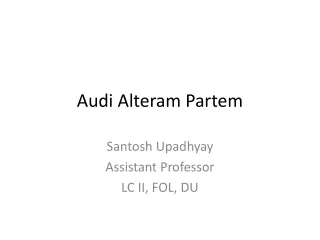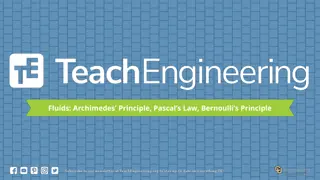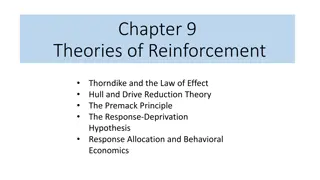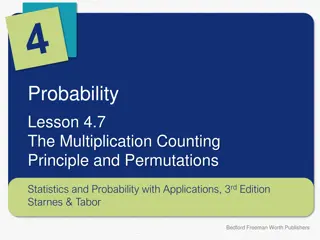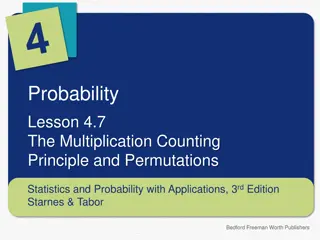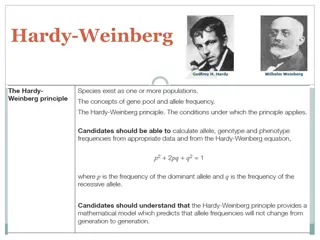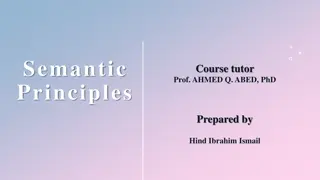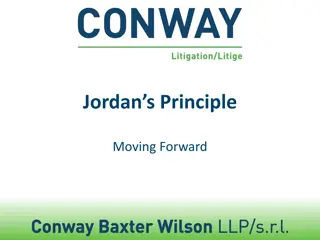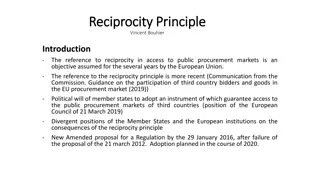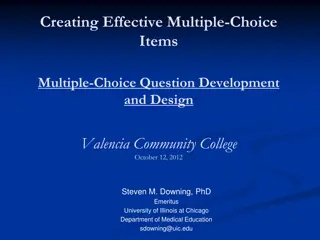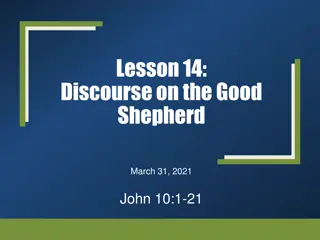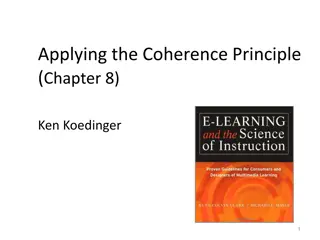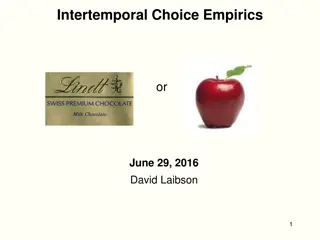Audi Alteram Partem
Explore the fundamental concept of fairness and justice in human society through the principle of Audi Alteram Partem, which ensures that both sides are heard before passing a judgement. This principle is a basic requirement of the rule of law and is essential for upholding civilised society.
1 views • 35 slides
Why Investing in Silk Sarees is a Wise Choice
By embracing silk sarees, we embrace timeless elegance and contribute to the conservation of our rich cultural heritage. Thus, the next time you contemplate expanding your wardrobe, consider investing in a silk saree\u2014it's a choice you won't regret.\n\nTo know more, please read the blog https:\/
2 views • 5 slides
Understanding Boat Floatation with Archimedes Principle
Explore the concept of why boats float using Archimedes' principle, which explains the relationship between density, volume, and buoyancy. Discover how objects sink or float based on their density relative to water, and experience a hands-on investigation to witness these principles in action.
5 views • 11 slides
Heisenberg's Uncertainty Principle in Elementary Quantum Mechanics
Heisenberg's Uncertainty Principle, proposed by German scientist Werner Heisenberg in 1927, states the impossibility of simultaneously and accurately determining the position and momentum of microscopic particles like electrons. This principle challenges classical concepts of definite position and m
0 views • 49 slides
Counting Principles and Pigeonhole Principle Explained
Explore the concepts of counting principles and the pigeonhole principle through practical examples and tips. Learn how to apply these principles to solve problems effectively. From understanding basic counting rules to the advanced pigeonhole principle, this content provides insights and guidance o
1 views • 35 slides
Understanding Fluid Mechanics: Archimedes, Pascal, and Bernoulli
Explore the principles of fluid mechanics including Archimedes' Principle, Pascal's Law, and Bernoulli's Principle. Learn about mass density, buoyant force, and the behavior of floating objects in liquids. Discover how the buoyant force is equal to the weight of displaced fluids, and how it affects
0 views • 22 slides
Understanding Buoyancy and Archimedes Principle
Explore the concepts of buoyancy, Archimedes principle, sink or float scenarios, and examples related to buoyant force calculations and floating objects. Learn how buoyant force determines whether objects sink or float in liquids, and understand the relationship between object density and fluid dens
0 views • 9 slides
Understanding Classical Mechanics: Variational Principle and Applications
Classical Mechanics explores the Variational Principle in the calculus of variations, offering a method to determine maximum values of quantities dependent on functions. This principle, rooted in the wave function, aids in finding parameter values such as expectation values independently of the coor
0 views • 16 slides
Understanding the Outer Space Treaty and the Lotus Principle
The Outer Space Treaty, comprising Articles I and II, establishes regulations on the exploration and use of outer space, emphasizing the benefit of all countries and free access to celestial bodies. The Lotus Principle, illustrated by the S.S. Lotus case, highlights that actions not explicitly banne
1 views • 4 slides
Understanding Electric Potential and Work Energy Principle in Physics
Exploring electric potential and work energy principle in physics, this content discusses the conservative nature of electric force, potential energy of charges, electric potential energy calculations, and work done by external agents to move charges. Practical problems and theoretical concepts are
0 views • 59 slides
Understanding Hard and Soft Acids and Bases (HSAB Principles) by Dr. Gurpreet Kaur
Delve into the world of Hard and Soft Acids and Bases (HSAB) with Dr. Gurpreet Kaur as she explains the characteristics of hard and soft acids, Pearson's HSAB principle, applications such as predictions of coordination in complexes, poisonings of metal catalysts, and the classification of acids and
2 views • 17 slides
Understanding C-Reactive Protein (CRP) Test: Uses and Principle
C-Reactive Protein (CRP) is a liver-produced protein that indicates inflammatory conditions. The CRP test helps detect infections, monitor diseases like cancer, and evaluate inflammatory conditions. The test principle involves latex agglutination for CRP detection in human serum.
0 views • 21 slides
Key Terms in Ch. 21: Reaction, Revolution, and Romanticism, 1815-1850
The key terms discussed in Chapter 21 include principle of legitimacy, balance of power, ideology, conservatism, principle of intervention, ultraroyalists, ministerial responsibility, and liberalism. These terms highlight important political philosophies and concepts during the post-Napoleonic era a
0 views • 17 slides
Understanding Le Chatelier's Principle in Chemical Equilibrium
Le Chatelier's Principle states that when a system at equilibrium is disturbed by changes in concentration, temperature, or pressure, the equilibrium shifts to counteract the change. This principle can be applied to predict the direction of equilibrium when changes occur. Changes in concentration, p
0 views • 10 slides
Theories of Reinforcement in Behavioral Economics
Explore key theories of reinforcement including Thorndike's Law of Effect, Hull's Drive Reduction Theory, the Premack Principle, Response-Deprivation Hypothesis, and Behavioral Economics concepts such as Response Allocation. Learn about reinforcers as stimuli, primary and secondary reinforcers, the
3 views • 9 slides
Understanding the Multiplication Counting Principle in Probability
The Multiplication Counting Principle and Permutations play a crucial role in determining the number of possible outcomes in various processes. This lesson covers how to use factorials to count permutations, compute arrangements of individuals, and apply the multiplication counting principle to dete
0 views • 14 slides
Understanding Jordan's Principle and Its Impact on First Nations and Inuit Children in Canada
Jordan's Principle was named in memory of Jordan River Anderson, a young boy whose tragic story led to the establishment of a legal requirement ensuring access to services for First Nations and Inuit children in Canada without delays or disruptions. This principle aims to prevent situations where ch
0 views • 9 slides
Understanding Fluids, States of Matter, and Phase Changes
Exploring key concepts in physics including Bernoulli's Principle, viscosity, cohesion, states of matter (solid, liquid, gas, plasma), phase changes (evaporation, condensation, etc.), density, pressure, and more. Discover the properties and behaviors of fluids in relation to gases and liquids, along
1 views • 54 slides
Understanding the Acceleration of the Universe and the Equivalence Principle Violation in the Horndeski Vector-Tensor Theory
Exploring the implications of the Equivalence Principle Violation after reheating in the context of the accelerated expansion of the universe. The study delves into the Horndeski vector-tensor theory, gravitational waves, and the impact of modified gravity and dark energy. Insights are provided on t
2 views • 20 slides
The Multiplication Counting Principle in Probability: Exploring Permutations
Exploring the multiplication counting principle in probability, this lesson delves into determining the number of ways to complete a process involving multiple steps. Using factorials for permutations, the content showcases how to compute permutations of individuals taken at a time. Through examples
0 views • 20 slides
Understanding Hardy-Weinberg Principle and Genetic Frequencies
Gene pool and allele frequencies play a crucial role in the Hardy-Weinberg Principle, a mathematical model predicting allele frequencies over generations. The principle outlines conditions like a large population, absence of mutations, random mating, and more. Equations such as p² + 2pq + q² = 1 h
0 views • 44 slides
Understanding Language Principles: Semantic and Syntactic Analysis
Language users rely on semantic principles like open choice and idiom to understand utterances, while syntactic analysis helps in grasping sentence structure. The interplay between lexical and phraseological features shapes language comprehension, showcasing tensions like in aspectual and idiomatic
0 views • 16 slides
Spring School Choice Webinar Highlights and Timeline
Explore the evolution of school choice in Massachusetts, with over 28 years of history and significant growth in enrollment and tuition rates. Discover important milestones throughout the year for school committees, DOR-DLS, DESE, and LEAs. Learn about the process, forms, and regulations related to
0 views • 21 slides
Principle of Majority Rule in Company Law
The principle of majority rule is a fundamental aspect of company law, where the powers of control over a company rest with the general meeting representing the majority shareholders. This principle emphasizes that decisions are made by a simple or special majority vote, except for powers vested in
0 views • 9 slides
Understanding Energy Choice in Illinois and Texas: Policy Considerations and Market Dynamics
Explore the Energy Choice policies in Illinois and Texas through key legislation such as the Illinois Customer Choice Act and Texas Senate Bill 7. Learn about the impact on retail rates, market participants, and customer switching behaviors. Gain insights into the evolution of retail choice in these
0 views • 20 slides
Proportionality as Core Principle in Supervising Heterogeneous Banking Sectors: Lessons from Germany
The supervision of a diverse banking sector, such as Germany's with roughly 2,000 banks, is based on the core principle of proportionality. This approach involves tailoring regulations and oversight to fit the individual characteristics of each institution, focusing on qualitative aspects, organizat
0 views • 8 slides
Implementation of European Code of Conduct on Partnership in Czech Republic: Meeting Overview
Meeting held in Prague on November 4, 2022, discussed the implementation of the European Code of Conduct on Partnership in the Czech Republic. The agenda included goals such as understanding the partnership principle, clarifying development mechanisms, and exploring its application in EU financial f
0 views • 10 slides
Jordan's Principle: Advocating for First Nations Children's Rights
Jordan's Principle is a vital advocacy tool aimed at ensuring equitable access to necessary services for First Nations children, emphasizing prompt resolution of jurisdictional disputes. Originating from the story of Jordan River Anderson, its implementation has faced challenges and legal battles. C
0 views • 21 slides
Understanding School Choice Mechanisms and Design Considerations
Today's class delves into the application of matching theory in the context of school choice, highlighting the importance of efficient placements, fair outcomes, and user-friendly mechanisms. Explore the evolution of school choice programs, the debate around placement mechanisms, stability considera
0 views • 32 slides
A Risky Choice - An Intriguing Journey Through Decisions
Embark on a captivating visual narrative depicting the consequences of A Risky Choice. Follow along as choices unfold through a series of thought-provoking slides, each revealing a different aspect of the decision-making process. Explore the complexities of decision-making and the potential outcomes
0 views • 21 slides
Brandywine School District School Choice Information Session
Brandywine School District is hosting a School Choice Information Session featuring Superintendent Lincoln Hohler, CFO Jason Hale, and Choice Coordinator Stacy Karpinski. Learn about Delaware's School Choice Program, open enrollment dates for the 2021-2022 school year, choice priorities, and require
0 views • 14 slides
Understanding the Pigeonhole Principle in Mathematics
The Pigeonhole Principle, demonstrated through examples and explanations by Dr. J. Frost, illustrates the concept that if you have more "pigeons" than "holes," then at least one "hole" must contain multiple "pigeons." This fundamental principle is essential in solving various mathematical problems i
0 views • 27 slides
Understanding the Reciprocity Principle in Public Procurement Markets
The concept of reciprocity in access to public procurement markets, particularly in the European Union, has gained prominence in recent years. This principle involves mutual opening obligations for public procurement markets while considering concessions and exceptions, such as excluding defense and
0 views • 4 slides
Multiple-Choice Item Development and Design Workshop
Explore the development and design of multiple-choice items with a focus on strengths, limitations, cognitive levels, common flaws, and quality improvement suggestions. Dive into selected-response items, cognitive assessment levels, and anatomy of test items. Understand the anatomy and structure of
0 views • 47 slides
Writing Lab: Principal vs. Principle
Learn the differences between "principal" and "principle" with this informative Writing Lab mini-lesson. Understand their varied meanings as nouns and adjectives, and how they are used in different contexts. Enhance your diction skills and avoid common usage errors. Enjoy learning about the principa
0 views • 4 slides
Reflections on the Good Shepherd Discourse and Freedom of Choice
The discourse on the Good Shepherd in John 10:1-21 highlights the relationship between Jesus and His followers, emphasizing eternal life and the faith of His sheep. The text delves into the concept of once saved always saved, the importance of obedient faith, and the belief in man's freedom of choic
0 views • 18 slides
Enhancing Student Learning Through Coherence Principle
The Coherence Principle emphasizes the importance of excluding extraneous, entertaining materials to improve student learning. Including such materials can compete for cognitive resources and divert attention from essential information. Utilizing simpler visuals and avoiding websites that violate th
0 views • 7 slides
Empirical Studies on Intertemporal Choice by David Laibson
This collection of empirical studies explores intertemporal choice behavior, focusing on preference reversals, commitment, and other related concepts. The studies reveal how individuals exhibit time-inconsistent preferences when making decisions about future and present outcomes, showcasing examples
0 views • 49 slides
Understanding the Generalized Pigeonhole Principle in Discrete Math
The Generalized Pigeonhole Principle is illustrated through an example involving selecting cards from a deck. By strategically grouping the cards, we determine the minimum number needed to guarantee at least three cards of the same suit are chosen. Additionally, the process is applied to finding the
1 views • 5 slides
Understanding the Importance of Patient Choice in Healthcare Commissioning
Patient choice plays a crucial role in healthcare commissioning, enabling patients to select from a range of providers to meet their individual needs. This approach, known as Any Qualified Provider (AQP), empowers patients and helps achieve local objectives, improving service quality and efficiency.
0 views • 27 slides
